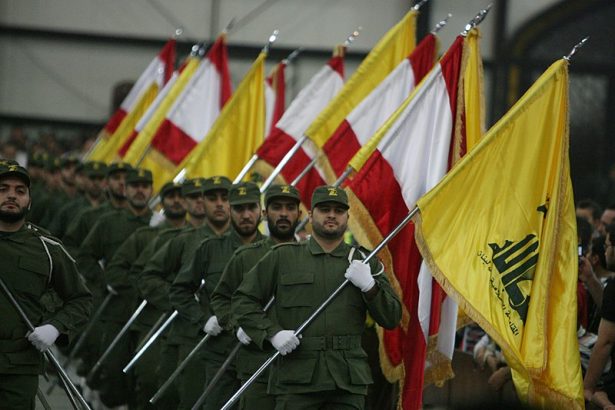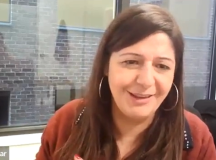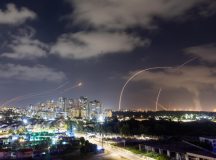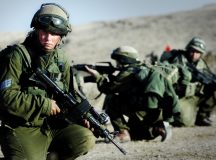Hezbollah fired rockets at Israel on Wednesday, July 17, setting off alarms in the coastal city of Nahariya and surrounding communities. It was one of a series of daily attacks carried out by Hezbollah. The Iranian-backed terrorist group has launched more than 5,000 attacks on Israel since 7 October, using rockets, missiles and drones. The attacks occur along Israel’s northern border, but they have become more deadly in recent weeks. Israel evacuated around 80,000 people from the border in October due to the attacks. However, civilians and soldiers continue to be harmed by Hezbollah’s endless assaults.
An Israeli couple was killed by rocket fire in the Golan on 9 July. In addition a Hezbollah drone recently killed an Israeli soldier in Kibbutz Kabri. More people are being wounded and killed by Hezbollah attacks but Israel has chosen to not response in any meaningful way for nine months, essentially surrendering northern Israel to Iran and Hezbollah. This form of surrender is unique in Israel’s history. Israel’s north has been under rocket threats for decades, dating back to the 1970s when Palestinian groups also targeted northern Israel with rocket fire. However, Israel’s leaders always understood that Israel’s presence in the Middle East had to be rooted in an iron will to never retreat and not let the enemy think Israel’s presence was temporary.
Hezbollah has been attacking Israel openly for months. It chooses the place and time of attacks and increasingly uses the attacks to test its drones and other munitions. Each time Hezbollah launches drone attacks or barrages of rockets, it puts out statements which are then run by Iranian media, bragging about the Hezbollah claims. Hezbollah frequently claims to target Israeli bases and sensitive sites in northern Israel. This takes the form, for instance of targeting what Hezbollah believes are surveillance sites, or IDF bases.
Iran mobilised Hezbollah as part of a multi-front war on Israel after 7 October. For Tehran this war is not just about Gaza, but bringing the whole region of Iran-backed proxies into the conflict. This is a regional war. Iran mobilized Hezbollah on October 8 and the Houthis in Yemen several days later. It has also pushed Iraqi-based militias to attack Israel and attack US forces in Iraq and Syria. The fact that all these groups have carried out attacks shows that they do not fear Israel anymore. They are not deterred. This would not have been the case in years past. Hezbollah after the 2006 war did not carry out attacks on Israel, except in rare exceptions where Hezbollah claimed to be retaliating for Israeli actions. Now Hezbollah is the one taking the initiative. Israel trained for years for a possible conflict with Hezbollah but now the IDF finds itself on the defensive in the north. The unprecedented evacuation of the border also now leaves Israelis afraid to return. The message is disconcerting.
When the Houthis attacked Tel Aviv with a drone on July 19 one person was killed and ten wounded. Israel retaliated with a large attack on the port of Hodeidah in Yemen. This attack was supposed to send a message that if groups kill Israelis, they will suffer major consequences. However, Hezbollah continues to fire rockets and drones at Israel and the Houthis have vowed more attacks. They continue to not be deterred.
Iran’s acting Foreign Minister Ali Bagheri Kani claimed this week in New York, where he was speaking at the UN and holding meetings, that if the war in Gaza ends, then Hezbollah may end its attacks. ‘Everyone knows the conflict in southern Lebanon is rooted in the Zionist crimes in Gaza. Over the past 9 months, due to the continuation of crimes and genocide, regional resistance fronts have become active against the Zionists. Therefore, whenever the Zionist crime in Gaza ends, it is obvious that it can be expected that the resistance will not take action in other areas. But as long as the crime and genocide of the Zionists in Gaza continues, it is the right of the resistance to act based on its interests’, Bagheri Kani claimed.
The largest problem for Israel is that Iran has succeeded in linking the Hezbollah front to Gaza. Israel chose not to respond strongly to Hezbollah because the IDF is tied down in Gaza. Therefore, Israel conducts precision and proportional responses to the Hezbollah attacks. However, this benefits Hezbollah more than Israel. Israel has always understood that its presence in the region is dependent on deterring stronger enemies. If Israel tries to go for a war of attrition it will lose in the long run, because Israel has more to lose. Israel is a powerful hi-tech economy. Lebanon is bankrupt. Every day that Israel wastes in a war of attrition with Hezbollah, benefits Hezbollah and Iran. Evacuating citizens for a year is not an answer. What happens the next time there is a flare-up in Gaza, will Israel send 100,000 people in northern Israel away from their homes every year or two when Hezbollah decides to attack?
Hezbollah is learning a lesson from this war. It has improved its drones and rockets. It has also watched how Israel responds. It can also read Israel’s media where commentators write about how a war with Hezbollah will be difficult. Hezbollah was allowed to grow too strong since 2006, much as Hamas also grew exponentially stronger and carried out the 7 October attack. Now Hezbollah has painted Israel into a corner. Hezbollah’s daily attacks became a ‘norm’ and if Israel strikes back harder it will be perceived as the aggressor. Israel has lost the initiative and the deterrence. It must get this back before the Gaza war ends. If Hezbollah is allowed to walk away having launched more than 5,000 attacks and having only lost around 300 of its members, it will feel it won. Then it will also be only a matter of time before another cycle of war begins with Hezbollah. This is how Iran got Israel to accept ‘managing’ the conflict in Gaza, until 7 October. It created rounds of war and made Israel get used to rocket fire. This is like slowly cooking a frog in ever-warming water. Israel is being slowly made to accept these attacks without an easy way out of this cycle.





































